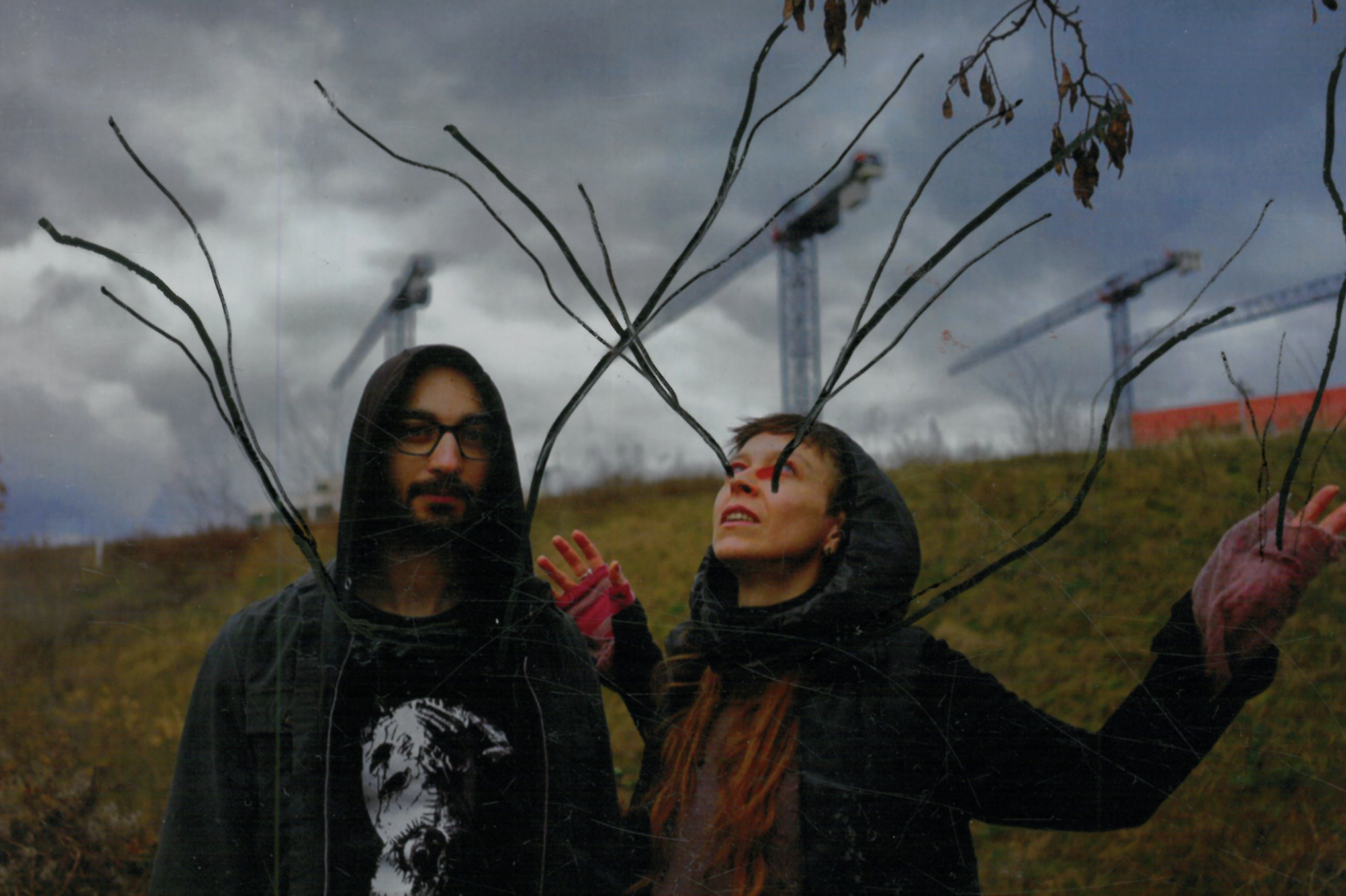
A raw blow to the lunar plexus, the Berlin-based duo of Ilia Gorovitz and Asja Skrinik is a relentless fusion of industrial, punk, noise rock, and metal, engineered with the precision of a sonic weapon. Gorovitz’s ruthless drumming anchors Skrinik’s aggressive shrieks and guttural vocalisations, riding on dissonant layers of droning soundscapes, mechanical hums, and shattered metallic crashes. The result alternates between fierce outbreaks and moments of eerie, atmospheric build-ups—a sojourn through industrial wastelands with the septic beauty of a rusty oil sheen. As a live act, PΞB thrives on intensity, blending elements of Grand Guignol horror, spoken-word poetry, and metal-inspired vocal performance to create a viciously throbbing experience that is both musical and theatrical.” (CTM Festival)
“PΞB is pain, PΞB is joy, it’s an illness, but can be a cure.” Can you elaborate?
We could make some shit up right now, but this is what our friend wrote in his music journalism lingo about our album IAMCHAINSAW. He was probably trying to convey the sense of dualism and contrast in our music, which can be intense, yet also cathartic.
How did you form the project? What is the genesis of PΞB?
We were both members of a collective that organised concerts and we started jamming together. Then Covid hit, and we took a break. During that time, Ilia was working on his solo album, OBFUSCATION, collaborating with various vocalists. That was the first time we created a song together. Later, we resumed rehearsing together in a more serious way because we realised that we had a good thing going on. We both liked the idea of making music that was more straightforward compared to what we were doing before. For Ilia this meant going for a more structured, more repetitive music that grooves. For Asja, it meant embracing minimalism after her previous projects VVRNGDNG and BALG, which were very complex and technical.
How important is the underground scene to your music and your work—the DIY, basement-driven live music scene that’s been so vital for the music ecosystem?
Everything starts in a mouldy basement. The seeds are sown there, and the industry just harvests the ripe fruit if it fits their menu for one night. But it’s not just about your 15 minutes of fame. Sometimes you have to clean the toilet after Amber’s puke—she just arrived in Europe, and oh my god, it’s so amazing.
The so-called underground or DIY scene is the only thing we know. This is what shaped us. Of course, there are a few exceptions; we’ve also played in bigger festivals or venues, but those don’t feel like home.
For us, it’s not just a scene; it’s a borderless community where we exchange ideas, knowledge, and also equipment. Half of our gear is scavenged scraps or self-built instruments, and half of the gigs we’ve played were in “don’t slip, bring your own toilet paper, Sterni for 1 Euro, this place had a different name yesterday” kind of venues.
How do you make music together? How does the vocal part of the project come to life?
It all starts with a drum pattern, a sound, or a combination of different elements.
In every rehearsal we jam a little, try things out, record them, and listen back. Sometimes there are true treasures in there, sometimes we’re flogging a dead horse. Every idea is worth trying, even if it sounds stupid—you never know. We also sometimes break our teeth on hooks that sound promising but never quite click. Most songs go through a long process of shaping and reshaping, even after we’ve played them live.
The vocal part usually emerges in a very intuitive moment, reacting to the skeleton of the rhythm and sound. The right moment is sometimes gone in an instant, so it’s more of a gut feeling than a thought-through composition.
The vocals are probably the most dynamic and flexible part of our music. What feels right changes from gig to gig. It’s never just about singing the song; it’s also about reacting to the people, being in the moment, in a particular venue or festival, with a specific line-up.
What is the role of affect and intensity in your work?
We’re both very sensitive and dead inside, so for us it’s all about dynamics, contrast, and balancing “intense” moments with more spaced-out parts or silence.
Horror movies and weird stuff are totally our thing, so we place our music in a world of uncanny, raw, primal, and visceral aesthetics. But most likely, the intensity comes from a fear of being boring.
In today’s world, when anxiety, fear, and tension seem to pervade everything, what does noise music strive to express? Is it a reflection of the world at large, or does it have a deeper, more abstract and introspective message—in your case, specifically?
Nothing makes you more present than a blast of noise from a powerful sound system. Sometimes that pummelling is exactly what you needed. The use of noise in our music is probably some subconscious attempt to express our suppressed emotions from our fucked-up childhoods, but instead of going there, let’s just say: Wubba Lubba Dub-Dub.
What projects have you been involved in recently?
We have two upcoming tracks on different compilations: one for a compilation by Antibody Label and one for Small But Hard Records. We’re also working on our next album.
Besides PΞB, Asja has another duo called TRAS with the poet and drummer Teresa Riemann. They just recorded their debut album, which will be out on Edelfaul Records in February 2026.
Ilia is co-running Edelfaul Records alongside Sun Ra Bullock and also plays in another band called “My Blood is Confusing”.
Interview Lucia Udvardyova
Photo Alessia Savoini